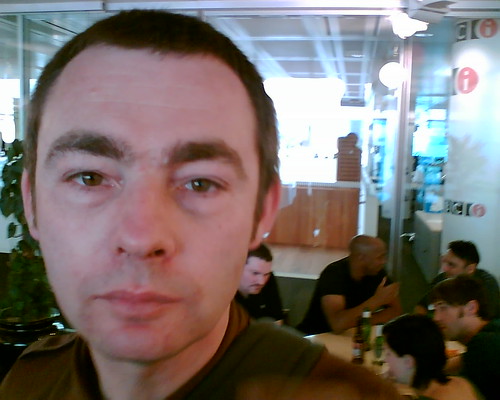Old Dogs, New Tricks, NMK

Today I'm on the Old Guard, New Tricks panel at the NMK Forum trying to make some sense of
"How is so-called MSM (Mainstream Media) facing up to the new wave of interest in social media? Is it absorbing social media strategies or ignoring it? What does social media mean for the bottom line of big media? And how do the social media startups view their effort"Here are the notes that i prepared thinking about the panel. See also fellow panellist Nico MacDonald .
I haven't got long but i hope i'll cover off these 4 things...
- Our old "fields of dreams" focus of approaching this space, feeling compelled to "host the conversation"
- The problems of Scale that that brought us despite considerable success.
- "social objects" (ie: tv and radio programmes) and trying to understand how the network changes our stuff and shifting our focus to trying to reflect and engage with those conversations *away* from bbc.co.uk. (read Lost and ripples-Dan Hill, this analysis of Heroes by Dan Taylor)
- The challenges that brings us of the BBC having to have antennae, reflecting it back in our output (radio good at this, web pretty bad), and finally engaging whether by tools or being "part of the community".. examples: 7 Ages of Rock, Flickr: How we built Britain, Paul Denchfield ARG for Radio 1, Andrew Marr: YouTube Group.
- I'll try and make a quip about new tricks, and say I'm James Bolam, or Dennis Waterman which will probably be received in silence.
- prevailing approach...
- Best summed up I'll might quote quoting Mitchell and Webb
Are you personally affected by this issue ? Then e-mail us. Or if you're not affected, can you imagine what it would be like if you were ? Or if you
were affected by it but don't want to talk about it can you imagine what it would be like not being affected by it ? Why not email us ? You may not know anything about the issue, but i bet you reckon something. So why not tell us what you reckon. Let us enjoy the full majesty of your uninformed ad hoc reckoning, by going to bbc.co.uk...clicking on "what i reckon" and beating on the keyboard with your fists and your head".
- This isn't far off the truth for some of the BBC's activity.
- Its what Lee Bryant calls "drive by commenting", users not having stake in that space, the you suck, no you suck level of engagement .
- The "call to action" lacks focus.
- I agree with Nico that we aren't using the BBC's or journalism's traditional skills, primarily of "hosting" in this space.
- We aren't doing enough of what Suw Charman, in her fantastic essay about this space called "curating"
2) Why we've had to change - scale...and chaos..
Our approach over the last 10 years, until recently has been to host the conversation. A Field of Dreams approach..
- This has caused us challenges in terms of "publishing flow" - lose trust of users because we don't publish their stuff or get round to even looking at it.
- moderation and cost - actually this has improved substantially at the BBC. Thousands of comments an hour are published live to the server.
- We get 1 comment every 2 seconds, around 1.5m/2m a month.
- Our blogs, forums, and community spaces like 606 get more unique users per week than Doctor Who.
We've also done a myriad of smallish train people with video cameras projects.
This doesn't scale ..We need to change our approach.
3.The Chaos
Thompson Quote from BBC internal magazine; Ariel this week.
- "I'm leading the BBC in a time of extra ordinary disruption in media. It may feel pretty bumpy inside the corporation; outside both in the UK and around the media, its close to chaos. ".
Actually a better description yesterday of where we are came from Yahoo's Tom Coates..."You're not competing with Facebook, you're competing with other companies *on* Facebook"
Essentially we can't expect users to come to us. We have to go to them
4.)The Challenges
Now my notes are running out of steam but essentially we are good at being a catalyst in this space. But our focus now is reflecting and engaging with the activity. See Tom Loosemore's 15 web principles.
These are the 2 that we need to get better at in this space.
- 6. The web is a conversation. Join in: Adopt a relaxed, conversational tone. Admit your mistakes.
- 14. Link to discussions on the web, don’t host them: Only host web-based discussions where there is a clear rationale
Labels: NMK07 bbc socialmedia


0 Comments:
Post a Comment
<< Home